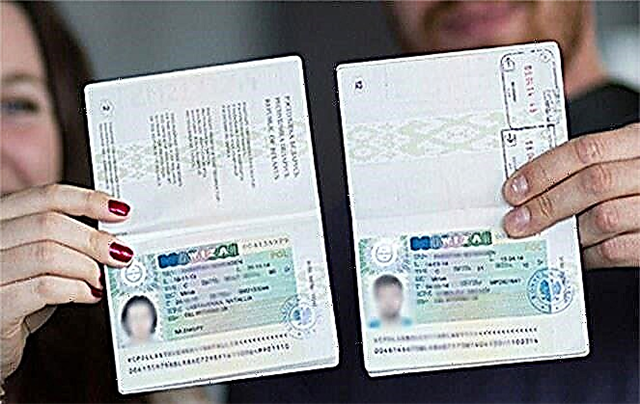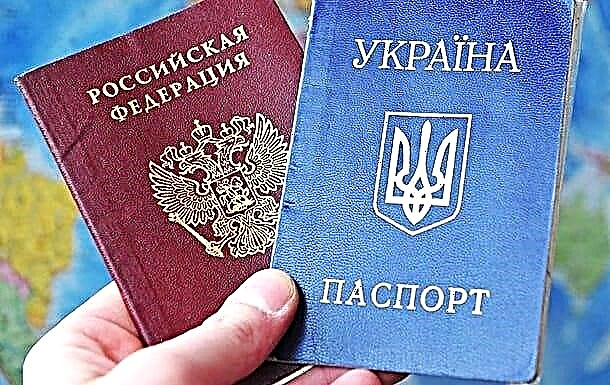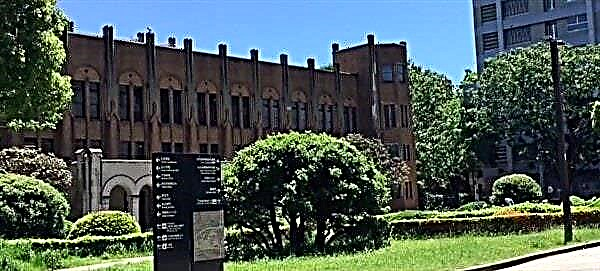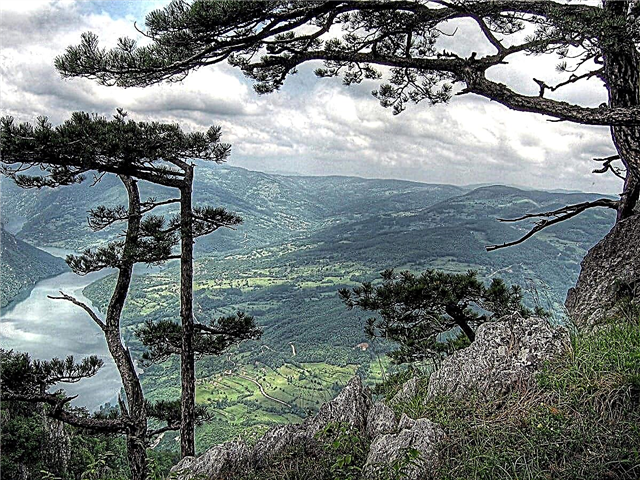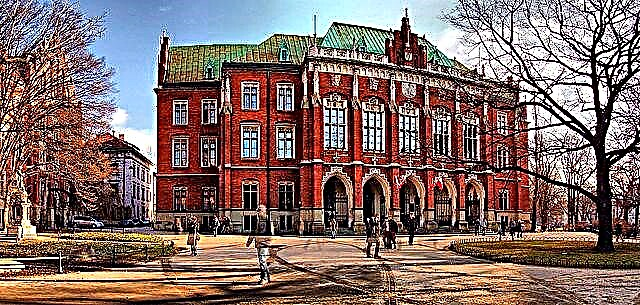One of the oldest universities in Europe, which has retained its popularity and prestige for several centuries, experts call the Jagiellonian University in Krakow. It combines ancient educational traditions and modern teaching technologies that attract not only Polish, but also foreign applicants. Students receive here knowledge of high quality and a diploma, which is appreciated in European countries.

A brief history of the university
Uniwersytet Jagielloński w Krakowie was founded in 1364. Students were recruited for three specialties: law, medicine, liberal arts (philosophy), a little later the faculty of theology was opened. In the 15th century, the royal dynasty of the Jagiellons paid special attention to the new educational institution, therefore the university was named Jagiellonian. Already in 1405, departments of mathematics and astronomy appeared at the university. Nicolaus Copernicus, a world-renowned scientist, is called one of the brightest students educated here.
In the 17th-18th centuries, faculties appeared at the university, where they study philology, ancient languages, natural sciences - chemistry, physics, astronomy, a university botanical garden was created, and teaching was switched to Polish instead of Latin. In the 19th century, in the universities of Warsaw, Vilno, Poznan, many professors were graduates of the Jagiellonian University.
King Jan Sobieski, Pope John Paul II, science fiction writer Stanislav Lem, writer Vasil Stefanyk graduated from the university at different times. Recently, the university celebrated the 650th anniversary of its foundation - during this time it has won recognition in Europe and around the world.
Infrastructure of the university and student life
On Jagiellonska Street in Krakow, there is a building that has housed a university since the Middle Ages. The red brick building, its courtyard and state rooms have long been the object of keen interest of tourists. Today it houses a museum of the university.
Classical faculties are located in historical buildings of the central part of the city, and the main university buildings are a 20-minute drive from the center of Krakow, where modern buildings equipped with the latest technology were built for the anniversary of the educational institution.
Students use the entire urban infrastructure, they move from one building to another, at their service are spacious classrooms, the latest equipment, a unique library with an excellent selection of books in all fields of knowledge, reading rooms, laboratories. All university life is regulated by student government, there is a folk dance ensemble, a choir, circles, sports clubs.
Many young men and women from their student days take part in scientific research, take an active part in the work of the Jagiellonian Innovation Center at the university, which is deservedly called a technopark.
What kind of specialists are trained by the faculties of the university
Currently, the university has 15 faculties. The youngest are faculties that train specialists in biotechnology and international relations; they were opened at the beginning of the 21st century. The oldest are medical, legal, philosophical.
Experienced teachers and professors teach students and prepare professionals in the following faculties:
- philosophical,
- law and administration,
- medical,
- pharmaceutical,
- health sciences,
- polonistics,
- historical,
- philological,
- physics, astronomy and applied informatics,
- mathematics and computer science,
- chemical,
- biological,
- management and social communication,
- biochemistry, biophysics, biotechnology,
- geography and geology.
These faculties offer over a hundred specializations in various fields of knowledge.

Admission to University: Highlights
The main thing that you should pay attention to upon admission is timely registration in the ERK electronic system, which takes into account the order in which the documents are submitted.
The second stage is the interview. The commission draws attention to the knowledge of Polish, in which the majority of students study, but it is also possible to study in a foreign language (English).
You should also take seriously the choice of the direction of further education: applicants may be asked to motivate their desire to get a particular specialty.
Requirements for knowledge of languages
Most of the programs offered by the university are implemented only in Polish, so if an applicant wants to get one of these specializations, he needs to confirm his knowledge of the language or undergo training.
The Faculty of Polish Studies offers courses in Polish as a foreign language. In addition, the university has a school of Polish language and culture, offering annual and semester Polish language courses, a summer training course, an Erasmus program, individual language courses and other programs for foreigners who need knowledge of the Polish language.
Required documents for admission
When registering, you must provide a package of documents:
- application in the prescribed form;
- questionnaire;
- educational document - a certificate, diploma, which has been translated by a sworn translator from Poland into Polish;
- proof of knowledge of the Polish language;
- medical certificate;
- insurance policy;
- registration fee PLN 200 for foreigners, PLN 75 for those with a Pole card;
- photocopy of the passport;
- photocopy of the visa.
For those who have passed the test and who are leaving for training, foreigners are issued a Polish student visa. For its registration, you will need the usual set of documents for the Schengen, plus an invitation from the university and a receipt for payment of tuition fees.

How is the receipt of a Pole's card
Residents of Russia, Ukraine, Belarus who have a Pole Card can enroll in a Polish university on special conditions. They can choose the form of study as Polish citizens and as foreigners. The first option equates applicants with Polish citizens and gives them the right to free study at a hospital. Those who choose the form of education for foreign citizens pay for their studies.
You can apply on your own or through the consulate.
For admission through the consulate in late February-early March, recruitment of students begins. At this point, you need to collect a package of documents for admission, attach the Pole's Card and submit the papers to the consulate. After an interview with the consul in Polish and obtaining permission to travel to Poland, exams are passed in mid-May. According to their results, the applicant is enrolled or not enrolled in the university.
To enroll on your own, you need to go to the official website of the university: go through online registration, make an application, get an invitation, apply for a visa (use a visa-free visa, use a long-term Schengen, which has already been issued earlier) and go to exams. Their successful delivery gives the right to enroll in a university.
How is studying at the university
For the first three years, students study at a bachelor's degree. After completing it, they receive a bachelor's degree. Those who receive specialties in the areas of "Psychology", "Law", "Medical Analytics", "Veterinary Medicine", "Pharmacy", "Physiotherapy", "Medicine", "Dentistry", study from 5 to 6 years and immediately receive the title of Master - this is the so-called indivisible magistracy.
Bachelors with a Polish diploma or citizens of another country with a corresponding document of higher education, which is equivalent to Polish, have the right to enter the second stage (magistracy) in other specialties. The training lasts 2 years, and graduates receive a master's degree.
The third stage is postgraduate study.Masters or those who have received a special Diamond Grant, both Polish citizens and foreigners, can apply for training. The study lasts 4 years, during which graduate students conduct research work and write a dissertation. After defending her, they receive a doctorate.

What is the cost of training
Applicants pay a registration fee. For Poles and those with a Pole Card - PLN 75, for foreigners - PLN 200. The entrance fee, which is paid in the first year, is 200 euros.
Further education for Polish citizens and Pole Card holders is free, foreigners pay tuition depending on the faculty and the course of study.
The cost ranges from 4600 zlotys per year for the specialties "Biology" and "Geography", which is a little more than 1000 euros, up to 12-14 thousand zlotys for oriental philology and medicinal chemistry (in terms of euros, this is 3-3.5 thousand). Up to 4 thousand euros are paid at the Faculty of International Relations and Medicine.
Accommodation in a hostel, if it belongs to the university itself, ranges from 70 to 120 euros, depending on how many people live in the room. A place in a rented hostel will cost much more - 120-180 euros per month.
Getting a scholarship
Since the beginning of the 21st century, a scholarship fund has been created at the Jagiellonian University, from which foreigners can receive payments.
Those who came to study from Eastern European countries can apply for such scholarships and grants: Queen Jadwiga, the Bogdana Lysyaka, Ad Polonos.
The first one is 1,500 zlotys per month (about 400 euros), the scholar lives at the expense of the university in a double room and receives free medical care.
The Bohdan Lysyak Foundation supports immigrants from Ukraine studying at the Faculty of Ukrainian Philology, Ad Polonos was created for the descendants of exiled Poles with a Pole Card.
Cost of living in Krakow
Studying at the Jagiellonian University attracts people from Central and Eastern Europe with an affordable standard of living in the country and, in particular, in Krakow itself.
Renting an apartment in the city will cost about 200-300 euros. Expenses for a modest meal - another 100 -150 euros, a travel pass - 8 euros. In general, in addition to tuition fees, you must have at least 350-450 euros per month for expenses.
Here are the approximate cost prices:
- a kilogram of potatoes - PLN 1.75 (EUR 0.4);
- 1 liter of milk - 2.46 (0.6 euros);
- 12 eggs - 6.59 (1.5 euros);
- 1.5 liters of water - 1.86 (0.45 euros);
- average check for lunch in an inexpensive cafe - 20 zlotys (5 euros);
- internet fee - 50.68 (12.50 euros);
- payment of utilities for an apartment with an area of 85 square meters - 663 zlotys (150 euros);
- jeans - 260 (65 euros).
The figures are averaged and their approximate euro equivalent at the 2021 level.
Other universities in Poland
The Jagiellonian University is the oldest and most prestigious in Poland, it is included in the list of the best universities in the world. But in the Polish Republic there are other educational institutions that attract the attention of not only Polish applicants, but also those wishing to continue their studies abroad from other countries - especially from Eastern Europe.
The University of Warsaw, the Adam Mickiewicz University in Poznan, the Nicolaus Copernicus University in Toruń, the University of Wrocław, and the University of Silesia in Katowice enjoy well-deserved fame. For those who are interested in these educational institutions, we advise you to read the information that characterizes the universities in Poland in more detail.
Conclusion
Every year it becomes more and more accessible for residents of Central and Eastern Europe to study at prestigious universities in Poland, which provide a decent level of knowledge and are quite affordable in terms of tuition and living expenses. Experts consider the Jagiellonian University in Krakow to be one of the most successful options for obtaining a profession. The diploma of this university opens up a wide range of opportunities for its graduates and is highly regarded in the European labor market.

